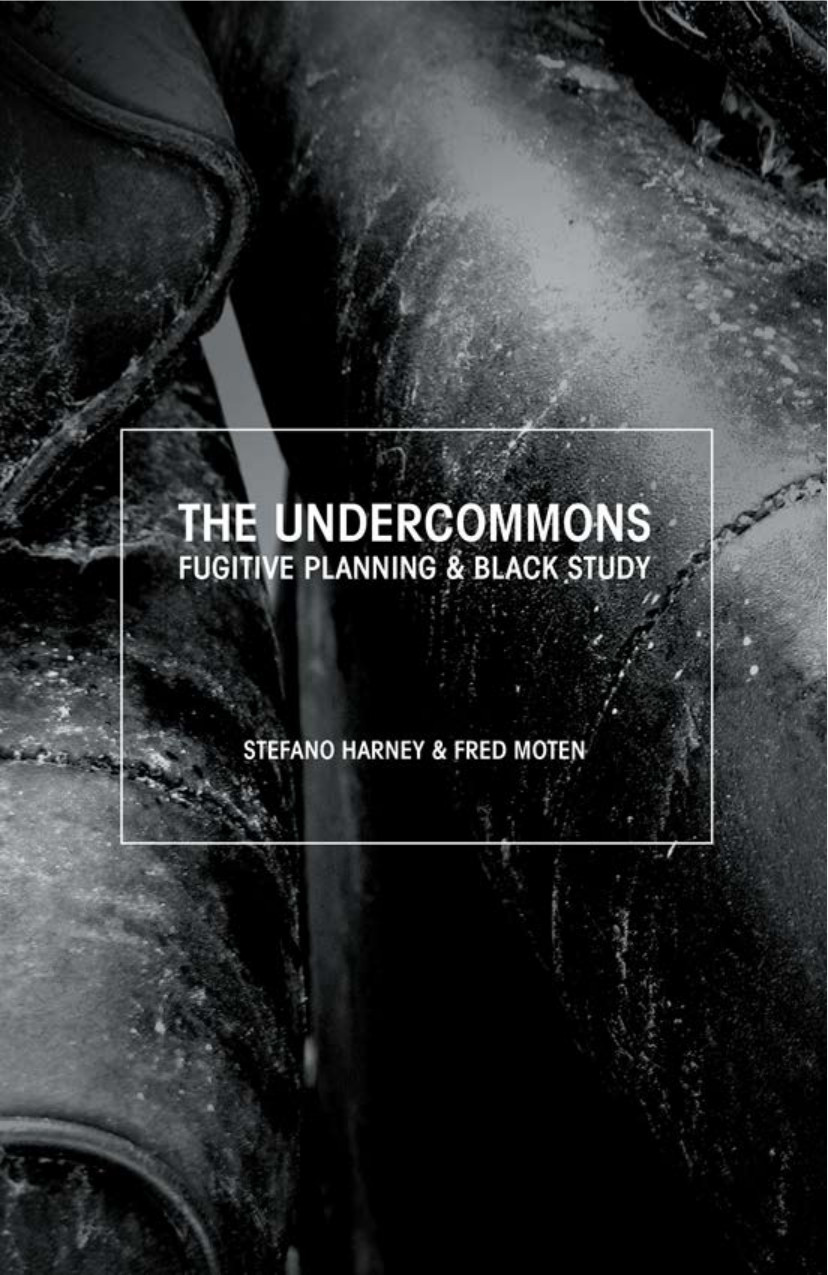Stefano Harney, Fred Moten: The Undercommons: Fugitive Planning & Black Study (2013–) [EN, DE, ES, FR]
Filed under book | Tags: · black people, blackness, commons, debt, politics, theory

“In this series of essays Fred Moten and Stefano Harney draw on the theory and practice of the black radical tradition as it supports, inspires, and extends contemporary social and political thought and aesthetic critique. Today the general wealth of social life finds itself confronted by mutations in the mechanisms of control: the proliferation of capitalist logistics, governance by credit, and the management of pedagogy. Working from and within the social poesis of life in the undercommons Moten and Harney develop and expand an array of concepts: study, debt, surround, planning, and the shipped. On the fugitive path of an historical and global blackness, the essays in this volume unsettle and invite the reader to the self-organised ensembles of social life that are launched every day and every night amid the general antagonism of the undercommons.”
Introduction by Jack Halberstam
Publisher Minor Compositions, Wivenhoe, 2013
Open access
ISBN 9781570272677, 1570272670
165 pages
Reviews: onderwijs filosofie (2015, NL), Kris Cohen (open set, 2016), Lisa M. Corrigan (Philosophy & Rhetoric, 2019).
Commentary: David Wallace (New Yorker, 2018).
Interviews with authors: Transversal (2016, EN/DE), Cristina Rivera Garza, Marta Malo, and Juan Pablo Anaya (New Inquiry, 2018), Millenials Are Killing Capitalism (2020, podcast, part 2).
Publisher (EN)
Publisher (DE)
Publisher (ES)
WorldCat (EN)
The Undercommons (English, 2013, PDF)
Die Undercommons (German, trans. Birgit Mennel und Gerald Raunig, 2016, EPUB)
Los Abajocomunes: planear fugitivo y estudio negro (Spanish, trans. Cristina Rivera Garza, Marta Malo and Juan Pablo Anaya, Cooperativa Cráter Invertido and La Campechana Mental, 2017, EPUB) (added on 2019-6-5)
Les sous-communs (French, 2022, added on 2022-1-11)
Richard J. Powell: Black Art and Culture in the 20th Century (1997)
Filed under book | Tags: · abstract art, african american culture, art history, black people, contemporary art, cultural history, dance, diaspora, harlem renaissance, installation art, painting, photography, postmodernism, race, realism, sculpture, video

“The African diaspora—a direct result of the transatlantic slave trade and Western colonialism—has generated a wide array of artistic achievements in our century, from blues to reggae, from the paintings of Henry Ossawa Tanner to the video installations of Keith Piper. This study of 20th-century black art is the first to concentrate on the art works themselves, and on how these works, created during a major social upheaval and transformation, use black culture both as subject and as context.
From musings on the “the souls of black folk” in early twentieth-century painting, sculpture, and photography to questions of racial and cultural identities in performance, media, and computer-assisted arts in the 1990s, the book draws on the works of hundreds of artists including Jean-Michel Basquiat, Romare Bearden, Elizabeth Catlett, Lois Mailou Jones, Wifredo Lam, Jacob Lawrence, Spike Lee, Archibald Motley, Jr., Faith Ringgold, and Gerard Sekoto; biographies of more than 160 key artists provide a unique and valuable art historical resource.
Richard Powell discusses the philosophical and social forces that have shaped a black diasporal presence in 20th-century art. Placing its emphasis on black cultural themes rather than on black racial identity, this book is an important exploration of the visual representations of black culture throughout the twentieth century.”
Publisher Thames & Hudson, London, 1997
World of Art series
ISBN 0500202958, 9780500202951
256 pages
Reviews: Deborah Kempe (Art Documentation 1997), Steven Nelson (Art Journal 1998), Kymberly N. Pinder (Art Bulletin 1999), Elizabeth Harney (Nka 1999), Donna Seaman (Booklist).
Author (2nd ed.)
Publisher (2nd ed.)
WorldCat
PDF (59 MB, no OCR)
Comment (0)Cherríe Moraga, Gloria Anzaldúa (eds.): This Bridge Called My Back: Writings by Radical Women of Color (1981–) [EN, ES]
Filed under book | Tags: · black people, class, feminism, gender, literature, race, sexuality, women

“This book is a testimony to women of color feminism as it emerged in the last quarter of the twentieth century. Through personal essays, criticism, interviews, testimonials, poetry, and visual art, the collection explores, as co-editor Cherríe Moraga writes, “the complex confluence of identities—race, class, gender, and sexuality—systemic to women of color oppression and liberation.””
First published by Persephone Press, Watertown, MA, 1981
Second edition
Publisher Kitchen Table: Women of Color Press, New York, 1983
ISBN 091317503X, 9780913175033
xxvi+261 pages
HT Lisa Nakamura
Third edition, revised & expanded
Publisher Third Woman Press, Berkeley, CA, 2002
ISBN 0943219221, 9780943219226
lviii+370+[8] pages
Commentary: Cassius Adair & Lisa Nakamura (Am Lit, 2017).
Wikipedia
Publisher (4th ed.)
WorldCat (3rd ed.)
PDF (English, 2nd ed., 1983, 4 MB, updated on 2021-3-16)
PDF (Spanish, 1988, 8 MB, added on 2021-3-3)
PDF (English, 3rd ed., 2002, 14 MB, added on 2021-3-16)
See also Home Girls: A Black Feminist Anthology (1983) and Words of Fire: An Anthology of African-American Feminist Thought (1995).
Comment (0)
